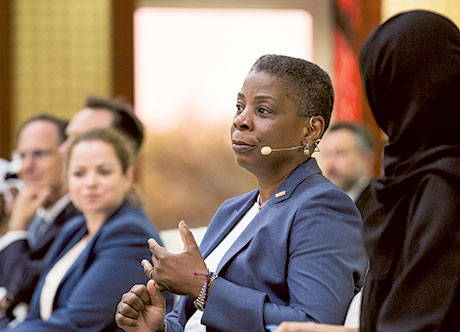
Abu Dhabi: The UAE leaders support advancement and empowerment of Emirati women as a key partner in building the future of their country, said Ursula M. Burns, chairman and CEO of Xerox — the world’s leading enterprise for business process and document management.
Burns told the audience at a lecture at the majlis of His Highness Shaikh Mohammad Bin Zayed Al Nahyan, Crown Prince of Abu Dhabi and Deputy Supreme Commander of the UAE Armed Forces, on Wednesday that the UAE leaders place women’s advancement and empowerment among the government’s top priorities.
Burns, who moved up the corporate ladder until she was named president of Xerox in 2007, particularly commended efforts of Her Highness Shaikha Fatima Bint Mubarak, Chairwoman of the General Women’s Union, Supreme Chairwoman of the Family Development Foundation and President of the Supreme Council for Motherhood and Childhood, to advance and empower Emirati women and the forming of the UAE Gender Balance Council.
The council is a federal entity chaired by President of Dubai Women Establishment, Shaikha Manal Bint Mohammad Bin Rashid Al Maktoum, wife of Shaikh Mansour Bin Zayed Al Nahyan, Deputy Prime Minister and Minister of Presidential Affairs.
The new body aims to boost UAE’s efforts to evolve and enhance women’s role as key partners in building the future of the nation.
Burns said although much progress has been made in many parts of the world, equality and empowerment continue to elude many women — particularly at leadership levels.
“The biggest surprise about my being named CEO six years ago was the attention it received. I knew that there would be some media attention regarding the first woman-to-woman CEO transition from my predecessor, Anne Mulcahy. I also knew that my being named the first black female CEO of a Fortune 500 company would draw attention. But I was surprised at the degree of attention. Quite frankly, at Xerox, it all seemed very natural,” Burns said.
Burns, also a board director of the American Express Corporation, Exxon Mobil Corporation and the Ford Foundation, said her becoming chairman and CEO is a sign of how far women have progressed. “But the attention it received then — and even today — is a reminder that we still have a long way to go.”
Burns added that globally, women are under-represented in leadership positions. “We are still at a point where gender seems to matter more than ability. For example, women hold about 5 per cent of Fortune 500 CEO roles. The number of women in senior management positions around the world is stagnant at 24 per cent. And within the ranks of public administration, women too often continue to be found at the lower levels of service where they have the least influence.”
She suggested changing these unacceptable statistics will take a sustained focus and dedicated leadership. Doing so isn’t just the right thing to do — it’s the smart thing to do for business and society at large.
Burns stressed at Xerox, they are committed to promoting a representative workforce comprising all ethnicities and genders. They do this because it is a winning proposition for their people, customers and shareholders.
“The key question is how to go about building and nurturing a culture of inclusion. I believe the short answer is that you do it the old-fashioned way — by embracing opportunity, hard work and determination. That’s the Xerox equation — opportunity plus hard work equals success. That simple equation has created an inclusive, robust, diverse workforce,” Burns said.
She added she is convinced that embracing diversity is a key to business success and, therefore, must be treated as a business imperative and a continuous journey.
“Creating a culture of diversity and inclusion also takes leadership at the top. I view leadership as the art of developing followership — organising people who are not merely willing, but enthusiastic and energised, to follow the direction that leaders set,” Burns said.
On good leaders, Burns said good leaders have a clear vision of where they want to take the organisation and they spend a lot of time sharing that vision with their people. “They put a lot of effort into aligning the whole organisation around a clear set of a few objectives. They are good listeners, decisive and bold. They celebrate impatience, translate it into bold action. They build great diverse teams. They have a strong moral compass, lead with their strengths and lead by example. And they are authentic.”
Burns said those are her observations on leadership — and they apply to women and men equally.
“The fact is, diversity and inclusion contribute to strengthening leadership and empowering success, and more and more organisations are coming to that realisation. In the future, those who fail to embrace this insight are at risk of being left behind,” Burns concluded.












